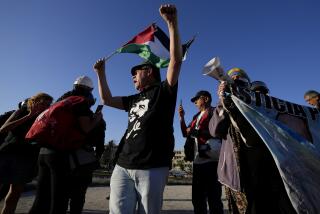Signal For Pinochet
- Share via
The Reagan Administration made a small but important gesture in support of human rights in Chile this week when U.S. delegates at a meeting of the Inter-American Development Bank abstained from voting for a loan to the government of Gen. Augusto Pinochet.
It was the first time that Washington had expressed public displeasure with the increasing repression of Pinochet’s government, which is the target of mounting public protests against economic policy and its suppression of political rights.
Pinochet has kept Chile under firm control since the coup that overthrew President Salvador Allende in 1973. Two years ago it looked as if the general was starting to relax his grip slightly, after he tried to legitimize his regime with a public plebescite supporting a new constitution that will keep him in power until 1990.
But, coming at a time of domestic economic troubles, the dictator’s transparent grab for more power angered many Chileans who proudly remember their nation’s tradition as a bastion of democracy in South America. They began to organize protests against the Pinochet regime.
Rather than acknowledge the justice of some of these protests, Pinochet became even more repressive, jailing and exiling political critics, stifling the nation’s free press and brutally crushing anti-government demonstrations. Not surprisingly, this repression generated a backlash among radical factions in the opposition, who have begun setting off bombs and assassinating public officials, leading to even more government repression. This vicious cycle has occurred before, most recently in Central America, and U.S. officials have no wish to see it reach the usual outcome--all-out rebellion with unpredictable consequences.
Chile receives no U.S. aid currently, so there were few forums where the United States could express its growing unhappiness with Pinochet. Because the development bank’s vote on a $130 million loan to Chile came only a few days after Pinochet extended a state of siege in his country, U.S. officials decided it “was time to send a signal.” That signal could have come sooner, but it is useful, nevertheless. Pinochet should not underestimate its significance.
More to Read
Sign up for Essential California
The most important California stories and recommendations in your inbox every morning.
You may occasionally receive promotional content from the Los Angeles Times.













